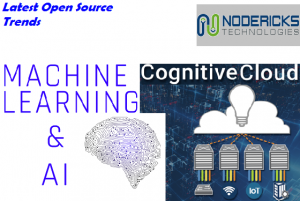
The next two topics coming in this series – latest open source technology trends – are, ‘Machine learning’ and ‘Cognitive cloud’.
- Machine learning and AI
Machine learning and ‘AI’ (Artificial Intelligence) give machines the ability to learn and improve from experiences, without the need for programming. Machine learning can be defined as the application of AI which provides this learning ability without being explicitly programmed, two systems.
Several open source technologies have already been leveraging machine learning as well as AI to implement high-end services and applications. Such intelligent, open source systems can be better understood by two simple generic examples like,
- Conversational platforms – Which enables a question and command experience while interacting with machines (like user asks questions and platform responds to it).
- Autonomous transportation – Intelligent vehicles, drones, etc.. which uses the application of AI, Mechatronics and sensors to enhance their features as well as to fully automate them.
Some of the popular open source machine learning / AI systems are, TensorFlow (Google’s own internal framework for deep learning, which was open sourced and made public two years ago). Other similar examples to TensorFlow are Keras, Microsoft CNTK, Amazon MXNet, etc.. Scikit-learn is another example, which is an open source library for machine learning and is written in Python.
Though now seems to be fancy, open source machine learning and AI systems will be taking commonplace in no time.
- Cognitive cloud
Cognitive computing is the technology which can simulate the human cognition process (It is the ability to acquire knowledge and understanding through thought, experiences and senses.) to solve complex problems whose answers may be unclear and uncertain. Cognitive computing uses many of the AI technologies to implement cognitive applications.
Cognitive cloud is the ‘cloud computing platform’ making cognitive applications to be available on any public cloud like AWS, Google Cloud, IBM Bluemix, as well as in an on-premise version based on ‘OpenStack’ open source software. IBM Watson is a most popular cognitive cloud, which uses IBM UIMA was made open source and maintained by the Apache foundation (IBM Unstructured Information Management Architecture (UIMA) is an architectural and software framework supporting creation, discovery, composition, and deployment of a broad range of analysis capabilities and their linking to structured information services, such as databases or search engines). Another example of open source cognitive cloud is OpenCog, which provides a platform to build AI apps and programs for developers and data scientists.
Being a cloud computing platform which creates and bring cognitive computing applications to the masses, cognitive cloud is all set to be the most demanded open source technology in near future.
To know more, please read –
Our blog-post on AI: https://www.nodericks.com/buzzworld-talk-artificial-intelligence/
Our blog-post based on Cloud computing: https://www.nodericks.com/cloud-computing-hosting/
Our blog-post on OpenStack: https://www.nodericks.com/series-latest-open-source-technology-trends/
Go to the previous article in this series
Check out the next article in this series, here – Topics 9 & 10 : ‘Blockchain’ & ‘IoT’
